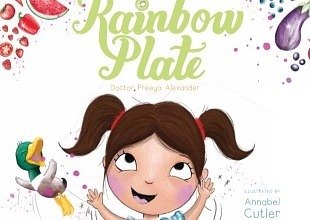Dr Alexander's Top Tips to Keep Healthy
April 29th, 2020Dr Preeya Alexander is a General Practitioner who is passionate about promoting healthy eating. Her new book, Rainbow Plate, encourages children to get excited about enjoying fruit and vegetables of every colour of the rainbow! In the age of COVID-19, Dr Alexander has some great tips for how to keep healthy while social distancing.
These are certainly tricky times we are facing – as a mother of 2 (of a nearly 4-year-old and an 11-week-old), the last few weeks have been testing. With the restrictions caused by the COVID-19 outbreak; ELC, swimming lessons and play dates cancelled and libraries, play centres and parks off the cards, it’s been a fairly taxing task keeping the kids, and adults, sane.
As a GP, I’m acutely aware of the potential mental health consequences of the current COVID-19 outbreak and social distancing measures. Many of us are ruminating over the fear of the unknown. It can be hard to turn the brain off and stop yourself from incessantly checking news feeds. It’s very easy to get wrapped up in the headlines, which can drive panic – things like exercise, eating well and supporting your mental health can fall to the wayside. Here are some practical suggestions for keeping your family’s physical and mental health high on the agenda despite the numerous life changes and stressors we are experiencing right now:
1. Aim to pack your meals with loads of vegetables! I know it’s hard right now with empty supermarket shelves (and within reason, of course – I am not encouraging stockpiling!). For adults, 5 serves of vegetables a day is recommended, and for children the serving sizes vary according to age (for a 2-year-old it’s 2.5 serves of veg per day for instance). FYI: 1 serve of vegetables is a cup of raw salad or ½ cup of cooked vegetables like wilted spinach or blanched broccoli. Lentils and canned beans are an easy way to get veggies in right now (and hopefully you can still purchase them!). Getting in enough veg reduces chronic disease risk (like type 2 diabetes and high blood pressure) and can reduce risk of certain cancers like bowel cancer.
2. Try to remain physically active (I know it’s not easy right now with gyms and many walking tracks shut). Even going for a walk around the house with the kids is wonderful for all of you. Just 30 minutes of exercise most days reduces chronic disease risk and 1 hour of exercise a week has been shown to prevent depression. Going for a walk is still considered an essential reason to leave the home (as of today’s date; things change so please check DoH guidelines if unsure). According to the Australian guidelines, pre-schoolers should aim for 3 hours of activity per day (across the day in increments) – walking, trampoline jumping, dancing, yoga – it all counts! If you can keep everyone moving it has loads of benefits for the body and brain!
3. Don’t ignore mental health – this is important for both you and children. Talking about the current COVID-19 outbreak with children in an age-appropriate reassuring manner can help. It’s key to deal with your own anxiety first, however (something I had to heavily work on before answering my daughter’s one million questions recently about coronavirus). Raising Children Network and the Royal Children’s Hospital have some wonderful resources on this. Play School have also done an episode to help children understand coronavirus better and the Wiggles have released a social distancing song. Introducing some regular meditation both children and adults is also a wonderful measure right now and something we have adopted in our home to deal with the stress.
These are tricky times and it's okay if you are feeling stressed and anxious, but here are some tips to help you and your family stay well during these uncertain times. Hopefully it will also give your brain a distraction from the constant checking of news feeds because if you focus on cooking a veggie-packed meal and fitting in some exercise it might just help yours and your family’s physical and mental health.
These are certainly tricky times we are facing – as a mother of 2 (of a nearly 4-year-old and an 11-week-old), the last few weeks have been testing. With the restrictions caused by the COVID-19 outbreak; ELC, swimming lessons and play dates cancelled and libraries, play centres and parks off the cards, it’s been a fairly taxing task keeping the kids, and adults, sane.
As a GP, I’m acutely aware of the potential mental health consequences of the current COVID-19 outbreak and social distancing measures. Many of us are ruminating over the fear of the unknown. It can be hard to turn the brain off and stop yourself from incessantly checking news feeds. It’s very easy to get wrapped up in the headlines, which can drive panic – things like exercise, eating well and supporting your mental health can fall to the wayside. Here are some practical suggestions for keeping your family’s physical and mental health high on the agenda despite the numerous life changes and stressors we are experiencing right now:
1. Aim to pack your meals with loads of vegetables! I know it’s hard right now with empty supermarket shelves (and within reason, of course – I am not encouraging stockpiling!). For adults, 5 serves of vegetables a day is recommended, and for children the serving sizes vary according to age (for a 2-year-old it’s 2.5 serves of veg per day for instance). FYI: 1 serve of vegetables is a cup of raw salad or ½ cup of cooked vegetables like wilted spinach or blanched broccoli. Lentils and canned beans are an easy way to get veggies in right now (and hopefully you can still purchase them!). Getting in enough veg reduces chronic disease risk (like type 2 diabetes and high blood pressure) and can reduce risk of certain cancers like bowel cancer.
2. Try to remain physically active (I know it’s not easy right now with gyms and many walking tracks shut). Even going for a walk around the house with the kids is wonderful for all of you. Just 30 minutes of exercise most days reduces chronic disease risk and 1 hour of exercise a week has been shown to prevent depression. Going for a walk is still considered an essential reason to leave the home (as of today’s date; things change so please check DoH guidelines if unsure). According to the Australian guidelines, pre-schoolers should aim for 3 hours of activity per day (across the day in increments) – walking, trampoline jumping, dancing, yoga – it all counts! If you can keep everyone moving it has loads of benefits for the body and brain!
3. Don’t ignore mental health – this is important for both you and children. Talking about the current COVID-19 outbreak with children in an age-appropriate reassuring manner can help. It’s key to deal with your own anxiety first, however (something I had to heavily work on before answering my daughter’s one million questions recently about coronavirus). Raising Children Network and the Royal Children’s Hospital have some wonderful resources on this. Play School have also done an episode to help children understand coronavirus better and the Wiggles have released a social distancing song. Introducing some regular meditation both children and adults is also a wonderful measure right now and something we have adopted in our home to deal with the stress.
These are tricky times and it's okay if you are feeling stressed and anxious, but here are some tips to help you and your family stay well during these uncertain times. Hopefully it will also give your brain a distraction from the constant checking of news feeds because if you focus on cooking a veggie-packed meal and fitting in some exercise it might just help yours and your family’s physical and mental health.

Rainbow Plate
Make healthy eating and a diet rich in fruit and vegetables fun, engaging and magical for children by putting a rainbow on their plate!Enjoy this adventure in healthy eating with Rainbow Plate!
find out more
Comments (0)
No comments have been submitted yet.
Why not be the first to send us your thoughts
Leave A Comment
Thank you for your comments,
they will appear shortly once approved.
TOPICS
EducationIllustrator SpotlightThe Indie Author seriesAuthor PostSTEMGuest postsDivorceAuthor Q&AInterviews
RECENT POSTSHAVE YOU SEEN...1
A cheeky glimpse behind the scene of new release My Dog Bruiser Swallowed a ScooterJune 18th, 20242
Dr Nickers talks to Little Steps Australia about capturing the day-to-day magic in everyday lifeMarch 11th, 20243
Paul de Guingand sits down with Little StepsMarch 4th, 20244
Step into the Secret Doorway with Author Catherine SheridanMarch 4th, 20245
"Take your time to walk, observe, ponder and wonder" - meet Lee FullARTon and her latest creationJune 13th, 20231
Creating your indie-author brand. The online edition!April 30th, 20192
The Indie Author’s Self-Publishing ChecklistMarch 1st, 20183
Introducing Lauren Thompson's There's A Bully in my BrainFebruary 24th, 20234
Guest Post - ‘Children and Anxiety’ by Karen Young, Author of ‘Hey Warrior’May 22nd, 20185
5 tips to become an author-illustrator power coupleAugust 6th, 2019